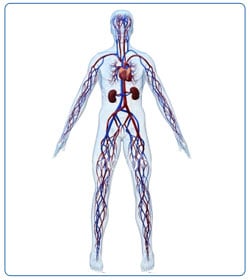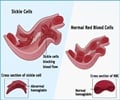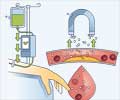Glossary
Globin: The protein component of hemoglobinSplenectomy: Surgical removal of spleen
Hb: Hemoglobin
Hemoglobin: Protein that enables red blood cells to carry oxygen and carbon dioxide
Thalassemia: The thalassemias are a group of genetic blood disorders that affect a person’s ability to produce hemoglobin
Mosaic: An individual with two cell types or more, comprising of different chromosome number or structure
Genetic Counselling: A communicative procedure that undertakes to deal with the problems that rise in a family with the occurrence or the risk of occurrence of a genetic abnormality
Pedigree: A pedigree involves recording a family's history and making use of a standard set of symbols to represent the status of each member of the family
Allele: An allele is an alternative form of a gene loated on a given locus of a chromosome
Gene: Genes are located on the chromosomes and carry the information representing a protein
Chromosomes: Chromosomes are structures made up of DNA and proteins found in the cells of all organisms.The number of chromosomes is species- specific.In humans it is 46.
DNA: The DNA is the basic unit of heredity and is known as the blue print of life.It carries the genetic codes which stores the necessary information for all organisms.
Genotype: Genotype indicates the genetic constitution of an organism
Phenotype: Phenotype refers to the physical appearance of an organism which is controlled by the genotype and the enviornment
Haploid Cell: A cell having only one set of chromosomes,ie.23 numbers in humans
Diploid Cell: Having two sets of chromosomes,46 numbers in humans
Hybrid: An offspring of parents belonging to two different species,example mule which is the offspring of a horse and donkey
Mutation: An inheritable change in the gene or the chromosome
Wild Type: An organism having a normal phenotype
Mutant: An organism harboring a mutation
Trisomy: A condition ,which arises due to the presence of an extra chromosome.An example is Down syndrome, where the individual has an extra chromosome 21
Mitosis: A division by which the cells reproduce, wherein the resultant cells are the replica of the parent cell.
Meiosis: A special kind of cell division,called reduction division, that takes place in the testes and the ovaries, which produces eggs and sperms that are haploid
Consanguinous marriage: A marriage between two closely related individuals
Euploidy: When an organism has the regular chromosome number,example 46 numbers in humans, it is euploid.
Aneuploidy: When an organism has an abnormal number of chromosomes as in Down Syndrome, it is known as aneuploidy.











